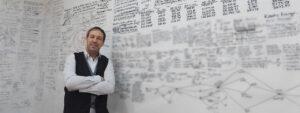
Richard Feynman and the Art of the Diagram
Richard Feynman introduced simple diagrams to visualize the complex mathematics of particle interactions. His intuitive approach advanced quantum electrodynamics and inspired generations of physicists.

Richard Feynman introduced simple diagrams to visualize the complex mathematics of particle interactions. His intuitive approach advanced quantum electrodynamics and inspired generations of physicists.

James Lovelock’s revolutionary Gaia hypothesis proposed that life actively regulates Earth’s environment to maintain habitable conditions. His bold systems view of the planet transformed science.

Physicist Leo Szilard adapted James Clerk Maxwell’s famous Maxwell’s Demon thought experiment from physics to genetics in the 1960s, showcasing cross-disciplinary thinking.

Marie Curie’s groundbreaking research into radioactivity revolutionized science. Her innovative approach and unwavering commitment to experimentation led to remarkable discoveries.

In order to explain the concepts of inertia and relative motion, Galileo devised a thought experiment involving a ship sailing smoothly across the sea. He

Game theory, pioneered by mathematicians like John von Neumann and John Nash in the 20th century, offers timeless insights into strategic decision-making through thought experiments like the Prisoner’s Dilemma.

In 1953, James Watson, Francis Crick, and Rosalind Franklin revolutionized science and medicine by discovering the double helix structure of DNA. Their breakthrough relied not just on experimental data, but on imaginative thought experiments.

Alan Turing’s imaginative thought experiments laid the foundations of computer science. His codebreaking shortened WWII and pioneered AI, but he faced persecution for his sexuality.

There is no excerpt because this is a protected post.

There is no excerpt because this is a protected post.
Our Scientific Innovation Newsletter.


Copyright © 2025 Newtonian Innovator. All rights reserved. | Privacy Policy | Terms of Service